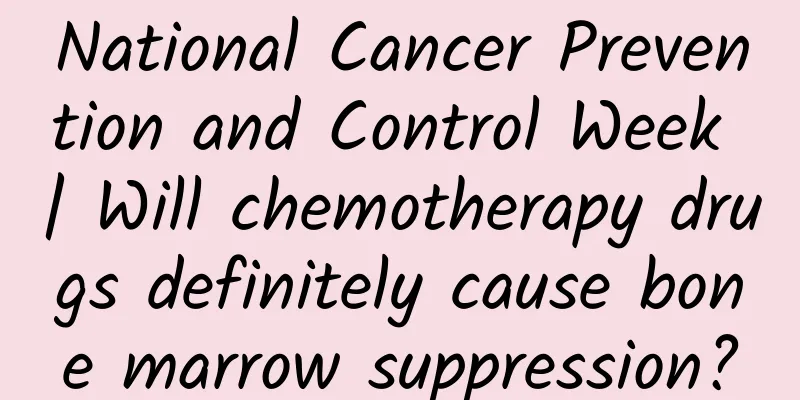National Cancer Prevention and Control Week | Will chemotherapy drugs definitely cause bone marrow suppression?

|
April 15-21 National Cancer Prevention and Treatment Week Recently, a clinical pharmacist in our hospital consulted a patient with lung cancer. After two courses of chemotherapy (pemetrexed + carboplatin + sintilimab), a blood routine examination revealed that his white blood cell count dropped to 0.3×109/L, hemoglobin dropped to 66g/L, neutrophils dropped to 0×109/L, and platelets dropped to 1×109/L. Severe bone marrow suppression occurred, endangering the patient's life. After repeated blood transfusions and active treatment with antibacterial drugs, the patient was out of danger. Chemotherapy is a method of using chemical drugs to treat malignant tumors. It is one of the three major methods of treating cancer, along with surgery and radiotherapy. Bone marrow suppression is a common adverse reaction to chemotherapy and radiotherapy. Patients often experience varying degrees of hemoglobin, leukocytes or thrombocytopenia. Severe bone marrow suppression not only delays the progress of chemotherapy and affects the treatment effect, but may also lead to complications and endanger the patient's life. What is bone marrow suppression? Can targeted drugs and immune drugs also cause bone marrow suppression? How to avoid severe bone marrow suppression? Let Yaowa take you to understand several important issues about bone marrow suppression during chemotherapy. What is bone marrow suppression and what harm does it cause? Most chemotherapy drugs are cytotoxic anti-tumor drugs, which usually produce the effect of "killing one thousand enemies and injuring eight hundred of your own", that is, while killing tumor cells, they have certain toxic side effects on normal cells in the human body, especially on bone marrow hematopoietic cells and other cells that divide and proliferate faster, causing peripheral blood hemoglobin, white blood cells, neutrophils and platelets to drop below normal levels, which is bone marrow suppression. Different degrees of bone marrow suppression have different hazards. At present, the clinical classification standard of bone marrow suppression after chemotherapy is generally used, see the table below. Hemoglobin, white blood cells and platelets play a pivotal role in the human body. Low hemoglobin will cause anemia; low white blood cells will reduce the body's ability to resist pathogen invasion; and low platelets will reduce coagulation function. For example, the patient mentioned above developed IV degree bone marrow suppression after chemotherapy. The patient had almost no coagulation function and ability to resist pathogens. Once bleeding or infection occurs, it will be seriously life-threatening. Do all chemotherapy patients experience bone marrow suppression? Not at all! Everyone reacts differently to chemotherapy. Some people react strongly to chemotherapy, while others have no discomfort. Therefore, due to individual differences in patients and different specific chemotherapy regimens, not all chemotherapy patients will experience adverse reactions such as bone marrow suppression. Moreover, during chemotherapy, under the guidance of a doctor, certain preventive measures can be taken when taking medication to reduce, control, or even avoid the occurrence of adverse reactions. In addition, many chemotherapy drugs currently used in clinical practice are not cytotoxic. For example, tamoxifen, letrozole and other drugs that regulate hormone balance in the body and are used to treat reproductive system tumors; monoclonal antibodies, gefitinib and other molecular targeted drugs generally do not cause bone marrow suppression in patients. How to avoid severe bone marrow suppression during chemotherapy? First, chemotherapy drugs should be avoided in patients who may suffer from severe bone marrow suppression, such as elderly people with very poor physical condition, patients with severe cardiovascular disease, and patients with significant bone marrow suppression after previous chemotherapy. Secondly, the body must have strong resistance to carry out various treatments smoothly. During chemotherapy, some cancer patients will experience significant weight loss and decreased appetite. Therefore, it is necessary to ensure adequate nutrition and intake of sufficient calories and protein. Try to eat some light and easily digestible high-energy, high-protein, and high-vitamin foods, such as milk, eggs, lean meat, fish, rice, noodles, soybeans and products, vegetables and fruits, and drink plenty of water to promote detoxification; you can appropriately supplement vitamin B12 and folic acid to ensure the supply of hematopoietic raw materials; if your physical condition allows, you can also do some simple exercises within your ability; ensure adequate sleep, sleep 8 to 10 hours a day. Finally, it is necessary to monitor blood routine regularly according to the doctor's instructions, and to deal with bone marrow suppression in a timely manner. This is why for every patient who has completed chemotherapy, the following instructions are usually included in the discharge summary: Check blood routine 3 days after discharge, and go to the hospital immediately if there is an emergency such as fever or bleeding. For patients with leukocytopenia of grade III or above who are considered to have poor self-recovery ability after evaluation, white blood cell-raising injections - granulocyte colony-stimulating factor - should also be used therapeutically. Bone marrow suppression is a common adverse reaction of most chemotherapy drugs. Cancer patients need to face it with a positive and healthy attitude. They also need to monitor regularly and reasonably, deal with problems in a timely manner, avoid severe bone marrow suppression as much as possible, and ultimately get better survival benefits. Author: Chen Xinsheng, Chief Pharmacist, Zhenjiang First People's Hospital, Jiangsu Province Review expert: Li Qiheng, deputy chief pharmacist, First People's Hospital of Zhenjiang City, Jiangsu Province Wang Baoxin, deputy director and pharmacist of the Pharmacy Department of Peking University First Hospital |
<<: What is the difference between quail eggs and chicken eggs? How to choose quail eggs
>>: Are you affected by these misunderstandings about high blood pressure?
Recommend
What to do if fetal membrane remains after delivery
After every birth, there is a process that needs ...
The best exercise for fighting depression is revealed. The first one is not running or walking, but...
"Life lies in exercise." Exercise is no...
Is it really good to be too thin?
Recently, a hospital in Hengshui, Hebei Province,...
What is the normal amniotic fluid index at 39 weeks of pregnancy?
At this stage of pregnancy, the baby is fully dev...
Girls are embarrassed to have colonoscopy
Colonoscopy is very important for everyone to tre...
How long does it take to restore vision after myopia surgery?
Will myopia surgery affect my work/school/travel ...
What are the side effects of long-acting contraceptives?
Contraceptive pills are a drug means for many wom...
How to get over a breakup? What zodiac sign can get over a breakup quickly?
The pain after a breakup is known to everyone who...
How to comfort my girlfriend when she has her period?
Women are generally in a bad mood during menstrua...
The colors of fruits are not just for the eyes! Please "see the colors" →
Fruits are not only sweet, but also contain a var...
Are dysmenorrhea patches useful?
Many female friends come to consult the editor, a...
Is hospitalization required for hysteroscopy?
Hysteroscopy is actually a relatively advanced de...
Sino: 2018 China Smartphone Data Report
The research institute Sinovation released its 20...
What to do if the umbilical cord is around the neck for two weeks at 36 weeks
As the fetus grows and develops in the mother'...
Is NT value 1.3mm normal?
During pregnancy, our biggest concern is that the...









